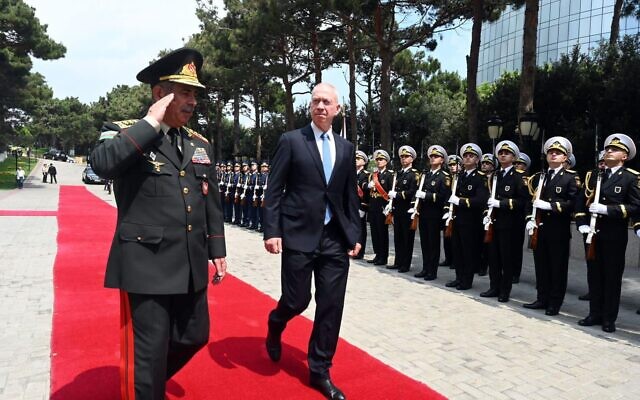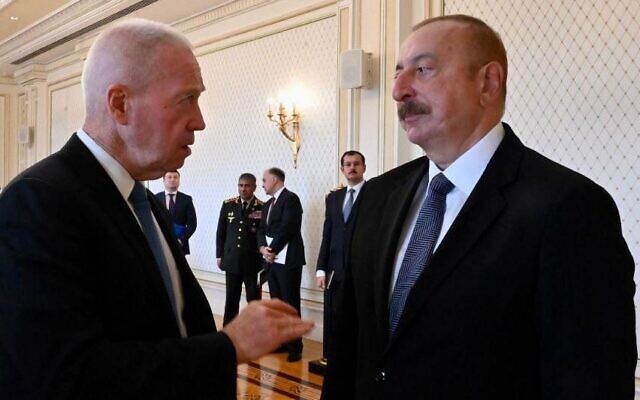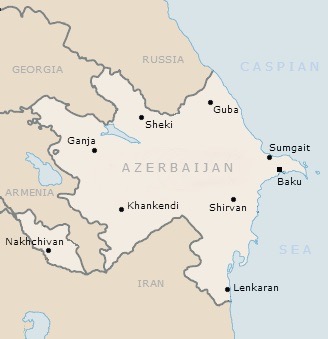Israeli Defence Minister Yoav Gallant’s two-day visit to Baku recently underscored Israel’s burgeoning ties with Azerbaijan, a secular Muslim state which shares a border with Iran, Israel’s arch enemy.
Gallant arrived in Baku, Azerbaijan’s capital, on July 13 with the objective of upgrading Israel’s strategic relationship with Azerbaijan in such key sectors as security, diplomacy and technology.

During his whirlwind trip, Gallant met President Ilham Aliyev, Defence Minister Zakkir Hasanov and other high-ranking ministers.
“The intensification of our relations comes at a special and tense time throughout the region, and therefore the visit is of very great importance,” Gallant said.

In all probability, he was referring to the growing tensions between Israel and Iran, whose budding nuclear program, military entrenchment efforts in Syria, and assistance to Hezbollah, Hamas and Islamic Jihad are of immense concern to the Israeli government.

Gallant was the fourth senior Israeli official to visit Azerbaijan — a former Soviet republic which attained its independence in 1991 — in less than a year. Foreign Minister Eli Cohen was there in April. President Isaac Herzog went in May. The then defence minister, Benny Gantz, paid a visit last October.

Israel, one of the first countries to recognize Azerbaijan’s independence, opened an embassy in Baku in 1993. Azerbaijan reciprocated only this past March, having waited three full decades before taking the plunge. Its decision signalled a new era in their bilateral relations.
Azerbaijan’s foreign minister officially inaugurated his country’s embassy on March 29, prompting Iran to complain about Azerbaijan’s “anti-Iranian orientation.”
Until recently, Azerbaijan — the first Shi’a Muslim nation to establish an embassy in Israel — kept its relations with Israel on an unobtrusive level. According to a 2009 U.S. diplomatic memo released by WikiLeaks, Aliyev once compared Azerbaijan’s relations with Israel to an iceberg. “Nine-tenths of it is below the surface,” he is purported to have said.
Aliyev opted for a more visible relationship with Israel in 2016, when, during a press conference with Prime Minister Benjamin Netanyahu, he discussed its depth and breadth.
Another milestone occurred during Azerbaijan’s Nagorno-Karabakh war with Armenia in 2020, during which Israeli military equipment played a substantial role in its victory. Until that point, Azerbaijan had bought about $5 billion worth of weapons and munitions from Israel.
During the war, Iran sided with Armenia, and the Azerbaijani embassy in Tehran was attacked, resulting in the death of an employee. Iran’s pro-Armenian position stoked anger in Baku and deepened Azerbaijan’s mistrust of the Iranian regime.
The 2020 Abraham Accords also pushed Azerbaijan closer to Israel. Until that moment, Azerbaijan was loath to offend Arab states by opening an embassy in Israel. But after the United Arab Emirates, Bahrain and Morocco normalized relations with Israel, Azerbaijan was no longer bound by this restraint.
And Israel’s reconciliation with Turkey, one of Azerbaijan’s major allies, made it easier for Aliyev to embark on high-profile relations with Israel.
Azerbaijan hopes that its increasing closeness to Israel will serve its interests in the United States, Israel’s chief ally. As far as Israel is concerned, Azerbaijan is a key access point to Eurasia, while its geographic proximity to Iran could be very useful militarily and valuable from an intelligence-collection point of view.

Cohen alluded to these factors after Azerbaijan decided to open an embassy in Israel: “Azerbaijan’s strategic location makes the relationship between us of great importance and great potential. Israel and Azerbaijan share the same perception of the Iranian threat. The Iranian regime threatens both our regions, finances terrorism, and destabilizes the entire Middle East.”
Apart from its closeness to Iran, Azerbaijan’s importance to Israel is two-fold. Israel buys upwards of half of its oil from Azerbaijan. And over the past decade, Israel has been one of Azerbaijan’s main weapons suppliers. Azerbaijan has bought air defence systems, radar and rifles, among other items, from Israel.
Between 2016 and 2020, Azerbaijan purchased 69 percent of its foreign-manufactured arms from Israel, according to the International Peace Research Institute in Sweden. Most recently, Azerbaijan bought two observation satellites from Israel.
As Cohen said recently, Israel hopes to upgrade its relations with Azerbaijan to new and unprecedented heights, but it remains to be seen whether Azerbaijan will reciprocate in the long run.
